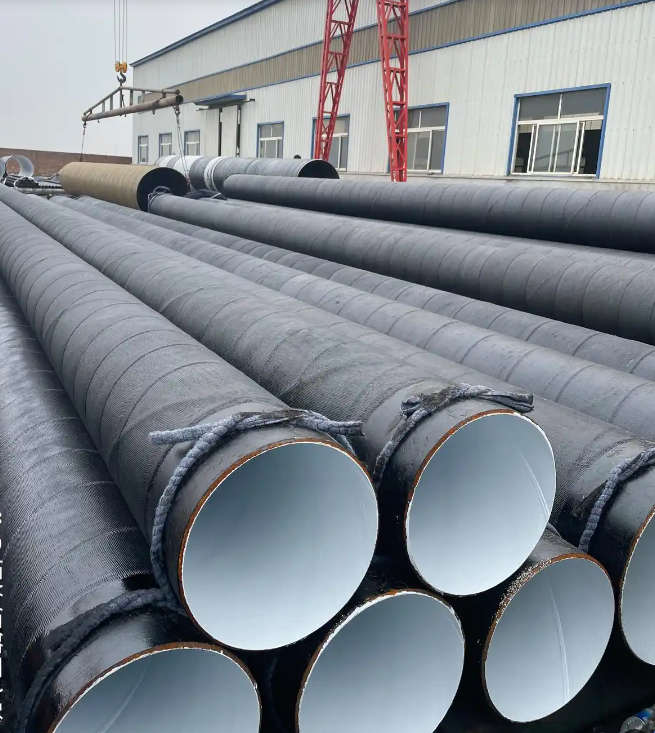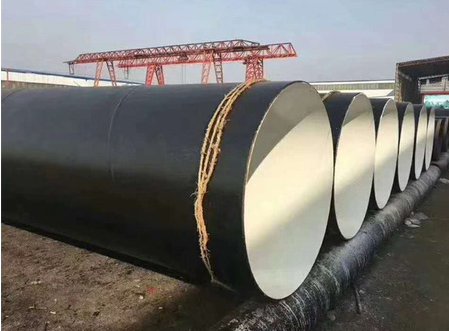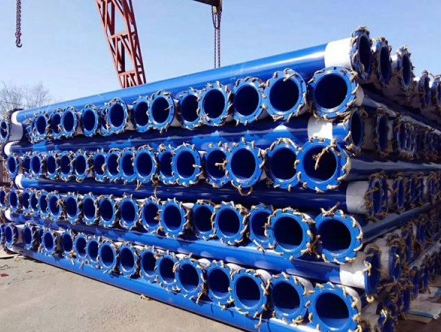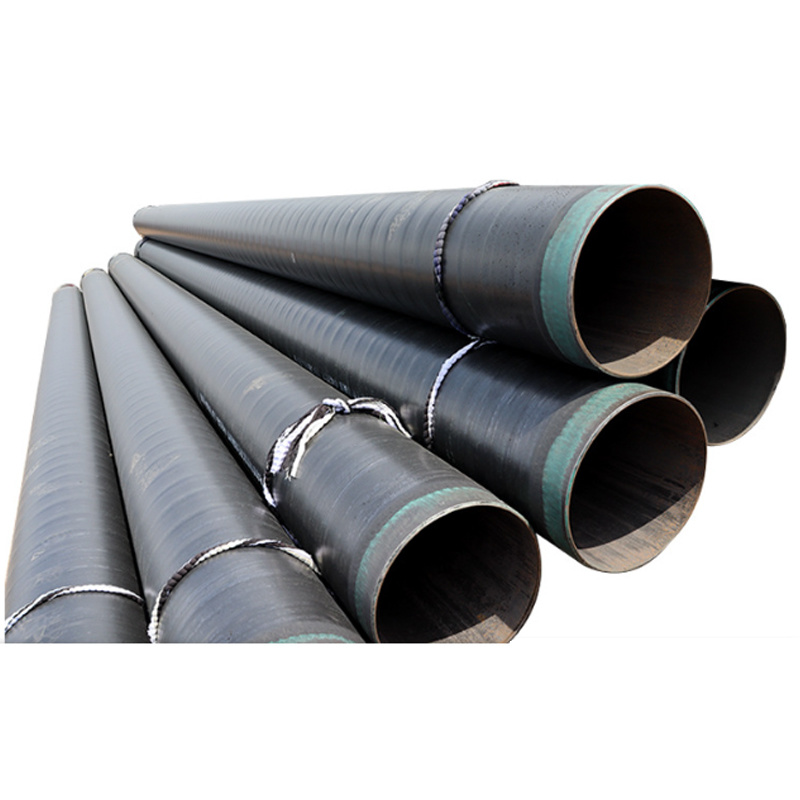Categories
Contact
E-mail :
mark@htzylinedpipes.com
WhatsApp:
+86-15632750373
Address:
Hebei Hengtai Group, 338 National Road North, Zhenggang Industrial Park, Yanshan County, Cangzhou City, Hebei Province
Coated Water Supply Pipes
Three Oil and Two Fabric Anti-corrosion Steel Pipe
The Three Oil and Two Fabric Anti-corrosion Steel Pipe uses a three-layer anti-corrosion coating and two layers of fiberglass fabric, effectively providing corrosion protection, pressure resistance, and chemical resistance. It is suitable for a variety of harsh environments and is widely used in industries such as petroleum, chemicals, and urban construction, making it an ideal choice for piping solutions.
Epoxy coal tar enamel (ECT) anti-corrosion pipes
Epoxy coal tar enamel (ECT) anti-corrosion pipes are made by applying an epoxy coal tar enamel coating to the exterior of steel pipes, providing effective corrosion protection in harsh environments. This type of anti-corrosion pipe is widely used in industries such as oil and gas, water supply, sewage treatment, and petrochemicals, where pipes are exposed to aggressive conditions, including moisture, chemicals, and high pressure. The combination of the steel core and the protective coating makes ECT pipes ideal for long-lasting performance in aggressive environments.Key Features:Outstanding Corrosion Resistance: The epoxy coal tar enamel coating provides excellent protection against corrosion from water, soil, and chemical media, including salts, acids, and alkalis. The coating is resistant to aggressive corrosion, making it ideal for underground or submerged installations.High Durability: Epoxy coal tar enamel has exceptional resistance to mechanical wear, environmental factors, and aggressive chemicals. It enhances the life expectancy of the steel pipe, reducing the frequency of maintenance or replacement.Excellent Adhesion: The coal tar enamel coating bonds tightly to the steel surface, forming a protective layer that adheres well even under high mechanical stress and temperature variations. This strong adhesion prevents corrosion from occurring at any weak points.Thermal and Chemical Stability: Epoxy coal tar enamel offers excellent performance in a wide temperature range, typically from -40°C to 80°C, depending on the specific formulation. It also shows high chemical resistance to hydrocarbons, acidic solutions, and various chemicals commonly found in industrial pipelines.High Abrasion Resistance: The coal tar enamel coating forms a thick, durable layer that resists abrasion, ensuring that the pipe maintains its integrity even when exposed to rough handling or high-flow conditions. This feature is particularly useful in mining, oil, and gas transport.Water and Moisture Resistance: The coating's water and moisture resistance make it ideal for use in humid environments, ensuring that the steel pipe is protected from corrosion even when buried underground or submerged in water.Environmental and Safety Considerations: Epoxy coal tar enamel coatings are environmentally friendly and safe to use, with low toxicity and no significant harm to surrounding ecosystems when properly applied.Easy to Apply: The epoxy coal tar enamel coating can be applied using various methods, including spray, brush, or dip coating, allowing for flexibility in manufacturing and installation processes.Cost-Effective: This type of coating is more affordable compared to some other advanced coatings, offering a cost-effective solution for projects where long-term corrosion protection is required.Applications:Oil and Gas Industry: For transporting crude oil, natural gas, and other hydrocarbons, where protection from corrosion is critical.Water Supply and Sewage Systems: Used for pipes carrying drinking water, sewage, or wastewater, particularly in areas prone to corrosion.Marine Applications: Suitable for pipelines exposed to seawater or other corrosive marine environments.Chemical and Petrochemical Industries: For transporting chemicals and industrial liquids, including in environments where exposure to corrosive substances is common.Mining and Industrial Pipelines: For use in mining slurry pipelines and other industrial process pipes that need robust corrosion protection.Technical Specifications:Coating Type: Epoxy coal tar enamel (ECT)Thickness of Coating: Typically ranges from 0.3 mm to 1.5 mm, depending on pipe size and application.Temperature Resistance: Typically -40°C to 80°C, depending on the formulation.Pressure Rating: Varies depending on the application but can typically handle up to 16 MPa or higher.Adhesion Strength: ≥ 2.0 MPaAbrasion Resistance: Typically tested using the Taber abrasion test; the coating should show minimal wear under standard conditions.Benefits:Long-Term Protection: Offers excellent corrosion protection, which significantly extends the service life of the pipeline.Cost-Effective: A more affordable option compared to other specialized coatings, providing effective corrosion control at lower costs.Low Maintenance: The durable coating reduces the need for regular inspection, maintenance, and repair of pipelines.Adaptability: Suitable for a wide range of industries and environments, making it a versatile solution for diverse applications.Reliability: Proven to perform well under harsh conditions, making it a reliable choice for critical infrastructure systems.Epoxy coal tar enamel anti-corrosion pipes offer a robust solution for pipelines exposed to harsh environmental conditions. The combination of steel’s strength and the coating’s corrosion resistance ensures a long-lasting and low-maintenance piping system suitable for a variety of industrial applications.
Inner and outer coating composite pipes
Inner and outer coating composite pipes (also known as epoxy coated or plastic-coated composite pipes) combine the strength of steel pipes with the excellent corrosion resistance of plastic coatings. These pipes are widely used in various industries, including petroleum, chemical, water supply, heating, and other infrastructure systems, where resistance to harsh environments is crucial. The composite pipe consists of a steel pipe as the core and plastic coatings on both the inner and outer surfaces to provide superior protection.Key Features:Superior Corrosion Resistance: The inner and outer plastic coatings provide excellent protection against rust, corrosion, and chemical attack. The plastic coatings are typically made of epoxy, polyethylene, or polypropylene, which ensure resistance to a wide range of corrosive substances such as acids, alkalis, salts, and other chemicals.Enhanced Durability: The combination of steel and plastic coatings extends the service life of the pipe. The steel pipe offers strength and pressure resistance, while the plastic coatings protect against environmental factors such as water, air, and chemicals, significantly reducing maintenance costs and downtime.High Pressure Resistance: The steel core provides excellent pressure resistance, making the composite pipe suitable for high-pressure applications, including water and gas transportation, as well as industrial processes that require robust and reliable piping systems.Smooth Inner Surface: The inner coating provides a smooth surface that reduces friction and minimizes flow resistance. This helps improve the efficiency of fluid or gas transport and reduces energy consumption in the system.Temperature Resistance: The composite pipe is designed to withstand both high and low temperatures, depending on the type of plastic coating used. For example, epoxy coatings can withstand temperatures up to 80°C, while polyethylene can handle temperatures up to 60°C.Anti-Scaling and Anti-Fouling: The smooth inner coating reduces the accumulation of scale and debris, improving the flow characteristics and reducing the need for maintenance. This is particularly useful in water and wastewater transport applications.Improved Aesthetic Appearance: The outer plastic coating can be customized with various colors and finishes, making it suitable for both above-ground and underground installations, while offering an aesthetically pleasing look.Lightweight and Easy to Install: The plastic coating reduces the overall weight of the pipe, making it easier to transport, handle, and install. The pipes are often easier to manage compared to solid metal pipes, reducing installation time and costs.Applications:Water Supply and Drainage: For transporting potable water, wastewater, and sewage, where corrosion resistance and hygiene are important.Oil and Gas Transport: For pipelines that need to withstand harsh environments and corrosion from hydrocarbons and other chemicals.Industrial Process Piping: Suitable for chemical plants, pharmaceutical plants, and manufacturing facilities that require durable, corrosion-resistant piping.Heating Systems: For use in district heating or industrial heating systems, where resistance to chemicals and high temperatures is essential.Marine and Coastal Areas: Especially useful in coastal areas or other environments where pipes are exposed to saltwater and other corrosive elements.Technical Specifications:Outer Coating Material: Typically epoxy, polyethylene, polypropylene, or PVC.Inner Coating Material: Epoxy, polyurethane, or other corrosion-resistant materials.Pressure Rating: Designed to handle pressures up to 16MPa or higher, depending on the pipe size and application.Temperature Range: Varies based on the coating material but typically ranges from -20°C to 80°C.Standard: Complies with international standards such as ISO, ASTM, or equivalent, depending on regional regulations.Benefits:Extended Service Life: Protects against corrosion and wear, significantly extending the life of the pipe.Cost-Effective: Reduces the need for frequent maintenance or pipe replacement.Environmental Protection: Provides a more sustainable solution for transporting hazardous or corrosive materials.Reliable Performance: The combination of steel and plastic coatings ensures reliable performance in various challenging environments.Inner and outer coated composite pipes offer an advanced solution for industries requiring durable, corrosion-resistant, and high-performance piping systems, ensuring long-term reliability and cost savings in maintenance.
3PE anti-corrosion coated steel pipe
Three-layer PE anti-corrosion structure for pipes: The first layer is epoxy powder (FBE > 100μm), the second layer is adhesive (AD) 170~250μm, and the third layer is polyethylene (PE) 2.5~3.7mm.











